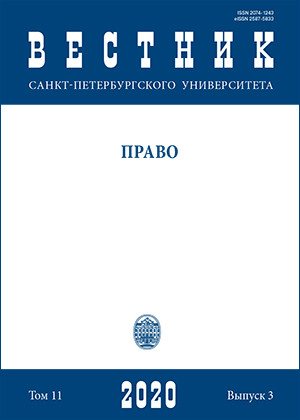Consequences of failure to pay a court fine
DOI:
https://doi.org/10.21638/spbu14.2020.307Abstract
The article discusses issues that arose during enforcement of the new grounds for exemption from criminal responsibility, enshrined in 2016, in connection with a court fine (Article 76.2 of the Criminal Code). Despite the criticism of its legislative regulation, demand for a new way of ceasing criminal prosecution began to appear in connection with the non-payment of a fine. Having determined the voluntary execution of a court fine, the legislator did not settle the issue of the further execution of the fine in cases where there are valid reasons for non-payment. After analyzing the existing proposals to solve this problem, the author confirms that the elimination of the gap would be facilitated by the legislative obligation of the bailiff to establish the circumstances by which the judicial penalty is not paid, as well as the addition of the list of decisions made by the bailiff to suspend enforcement proceeding. Analysis of judicial practice showed that Art. 76.2 of the Criminal Code began to be applied in cases where the court has justification for implementing less onerous grounds for the defendant to be exempt from criminal liability. Legislative duplication of the conditions under which criminal prosecution can be terminated for various reasons calls into question the wide alternative of the latter, as well as the embodiment of the idea of humanizing criminal law, which is the basis for securing a new ground for exemption from criminal liability. The article substantiates the proposal to supplement the Resolution of the Plenum of the Supreme Court dated June 27, 2013 with a provision allowing the release of a person from criminal responsibility with a judicial fine in cases where the court has no basis for suspending criminal prosecution for unconditional types of exemption from criminal liability. The author draws attention to the gap in the legislation, part 3 of Article 78 of the Criminal Code, which is related to the renewal of the statute of limitations for criminal liability when an individual avoids paying a court fine.
Keywords:
exemption from criminal responsibility, other measures of criminal law, court fine, failure to pay a court fine, valid reasons, limitation periods, grounds for exemption from liability, conditions for exemption from liability
Downloads
References
Downloads
Published
How to Cite
Issue
Section
License
Articles of "Vestnik of Saint Petersburg University. Law" are open access distributed under the terms of the License Agreement with Saint Petersburg State University, which permits to the authors unrestricted distribution and self-archiving free of charge.






